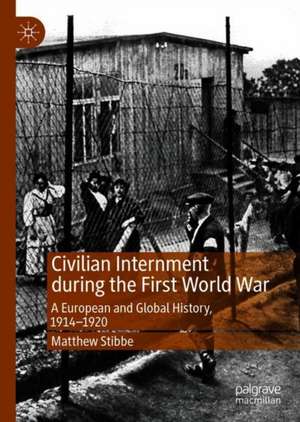Civilian Internment during the First World War: A European and Global History, 1914—1920
Autor Matthew Stibbeen Limba Engleză Hardback – 25 noi 2019
Preț: 786.36 lei
Preț vechi: 958.98 lei
-18% Nou
Puncte Express: 1180
Preț estimativ în valută:
150.47€ • 157.52$ • 124.50£
150.47€ • 157.52$ • 124.50£
Carte tipărită la comandă
Livrare economică 05-19 aprilie
Preluare comenzi: 021 569.72.76
Specificații
ISBN-13: 9781137571908
ISBN-10: 113757190X
Pagini: 335
Ilustrații: XI, 335 p.
Dimensiuni: 148 x 210 x 27 mm
Greutate: 0.57 kg
Ediția:1st ed. 2019
Editura: Palgrave Macmillan UK
Colecția Palgrave Macmillan
Locul publicării:London, United Kingdom
ISBN-10: 113757190X
Pagini: 335
Ilustrații: XI, 335 p.
Dimensiuni: 148 x 210 x 27 mm
Greutate: 0.57 kg
Ediția:1st ed. 2019
Editura: Palgrave Macmillan UK
Colecția Palgrave Macmillan
Locul publicării:London, United Kingdom
Cuprins
- Introduction
Germans and Austro-Hungarians
The German and Habsburg Empires’ Response
Ottoman Turkey, Bulgaria and the Balkans
3. Internment and War Governance in the First World War France
Britain
Germany Austria-Hungary War Governance, Camps and the Turkish Genocide against the
Ottoman Armenians, 1915-16
4. Imagining Internment: International Law, Social Order and National Community
International Law and Perceptions of the ‘Other’: the view of officials Reprisals and Punishments Internment and Social Control
Internment and ideas about ‘National Community’
5.Internment and International Activism: The Search for More Humane Alternatives
Pre-War Precedents: Emily Hobhouse and the South African Camps
The Auskunfts- und Hilfsstelle für Deutsche im Ausland und Ausländer in Deutschland
The Auskunfts- und Hilfsstelle and the ICRC
Neutral Internment in Switzerland and the Netherlands
Barbed-Wire Disease and the ‘Medicalisation’ of Internment
6.(Not) Ending Internment: The Years 1918-20
Wartime Civilian Captivity in Russia from Tsar Nicholas II to Lenin
Germany and Austria-Hungary
Imperial Britain and its Allies in Africa, Asia and the Atlantic Ocean
France, Italy and the ‘Little Entente’ (Romania, Czechoslovakia, Yugoslavia)
The ‘Red Scare’: the Americas
7. Conclusion and Epilogue
Notă biografică
Matthew Stibbe is Professor of Modern European History at Sheffield Hallam University. UK. A twentieth-century specialist working across and beyond the borders of Europe, he has co-edited two essay collections on First World War captivity, and is author of the British Civilian Internees in Germany: The Ruhleben Camp, 1914-18 (2008).
Textul de pe ultima copertă
This book is the first major study of civilian internment during the First World War as both a European and global phenomenon. Based on research spanning twenty-eight archives in seven countries, this study explores the connections and continuities, as well as ruptures, between different internment systems at the local, national, regional and imperial levels. Arguing that the years 1914-20 mark the essential turning point in the transnational and international history of the detention camp, this book demonstrates that wartime civilian captivity was inextricably bound up with questions of power, world order and inequalities based on class, race and gender. It also contends that engagement with internees led to new forms of international activism and generated new types of transnational knowledge in the spheres of medicine, law, citizenship and neutrality. Finally, an epilogue explains how and why First World War internment is crucial to understanding the world we live in today.
Caracteristici
Provides the first major study of civilian internment during the First World War as both a European and global phenomenon
Argues that the years 1914-20 mark the essential turning point in the transnational and international history of the detention camp
Demonstrates that wartime civilian captivity was inextricably bound up with questions of power, world order and inequalities based on class, race and gender
Argues that the years 1914-20 mark the essential turning point in the transnational and international history of the detention camp
Demonstrates that wartime civilian captivity was inextricably bound up with questions of power, world order and inequalities based on class, race and gender
